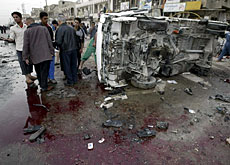
ICRC steps up efforts to stop Iraq violence

The Swiss-run International Committee of the Red Cross (ICRC) says it is working with over a dozen groups to stop the killing of some 100 civilians daily in Iraq.
At a news conference in Geneva on Thursday it condemned recent bloodshed in Iraq and called on all parties to halt deliberate attacks on civilians.
The Geneva-based organisation said it planned to expand its work in Iraq despite difficult security conditions for its staff. It also announced that it was close to an agreement with Iraqi authorities to allow its officials to visit prisoners held at Iraqi-run detention centres, where Sunnis allege inmates are tortured.
Georges Comninos, head of ICRC operations for the Middle East and North Africa, said the organisation was in contact with more than 12 groups described as “non-state actors”.
He said the ICRC was trying to identify or reach others either directly or through “other groups or authorities or institutions” in Iraq and in neighbouring countries to pass the message that the attacks on civilians must stop.
The ICRC, which tries to protect civilians under the Geneva Conventions, has well-established contact with Iraqi authorities and the US-led multinational forces, but so far has not been able to ensure regular contact with all non-state actors.
“Every single day attacks against civilians occur in Iraq,” Comninos said, noting reports that more than 7,000 people had been killed in September and October alone and that each day the toll is more than 100.
“The ICRC is deeply shocked by this appalling lack of respect for human life and dignity,” he said.
“Car bombs, shootings, abductions and killings have become commonplace,” he added. “Bodies lie in the streets, often maimed and unidentified.”
Detainees
In parallel, the ICRC announced that it was close to an agreement with Iraqi authorities to allow its delegates to visit prisoners held at Iraqi-run detention centres, where Sunnis allege inmates are tortured.
The organisation regularly visits 14,000 prisoners in Iraq, including 12,000 held by US and British forces, and 2,000 held by Kurdish authorities in the north of the country.
The humanitarian agency has been seeking access to all Iraqi-run prisons, including those under the Shi’ite-led interior ministry, accused by Sunni Arabs of operating torture centres and dungeons holding Sunni detainees.
“We are quite confident that this dialogue will materialise in an agreement in a short period,” said Comninos, but declined to provide an exact timeframe or any details.
The ICRC requires governments to allow it to interview detainees in private. Its confidential reports on conditions and treatment are sent only to the detaining authorities.
In a recent report the United Nations said there were nearly 30,000 detainees in the country, about half in Iraqi hands and half held by coalition forces.
swissinfo with agencies

More
International Committee of the Red Cross
The ICRC deploys 400 people in Iraq, including 352 Iraqis, with an annual budget of SFr38 million ($31.59 million), which will rise to SFr58 million Swiss francs ($48.21 million) next year.
A total of 11 expatriates are permanently based in the Kurdish part of the country, while 37 others are based in Amman, Jordan, from where they carry out regular visits to Baghdad, Basra and other parts of the country.
The ICRC regularly visits 14,000 detainees in Iraq, including 12,000 held by US and British forces, and 2,000 held by Kurdish authorities in the north of the country. It is still trying to work out regular visits to detainees held by the Iraqi government.
It helps hospitals with surgical and medical supplies to treat casualties and morgues to deal with the influx of dead bodies. It has also fixed water-treatment plants.

In compliance with the JTI standards
More: SWI swissinfo.ch certified by the Journalism Trust Initiative




























You can find an overview of ongoing debates with our journalists here . Please join us!
If you want to start a conversation about a topic raised in this article or want to report factual errors, email us at english@swissinfo.ch.